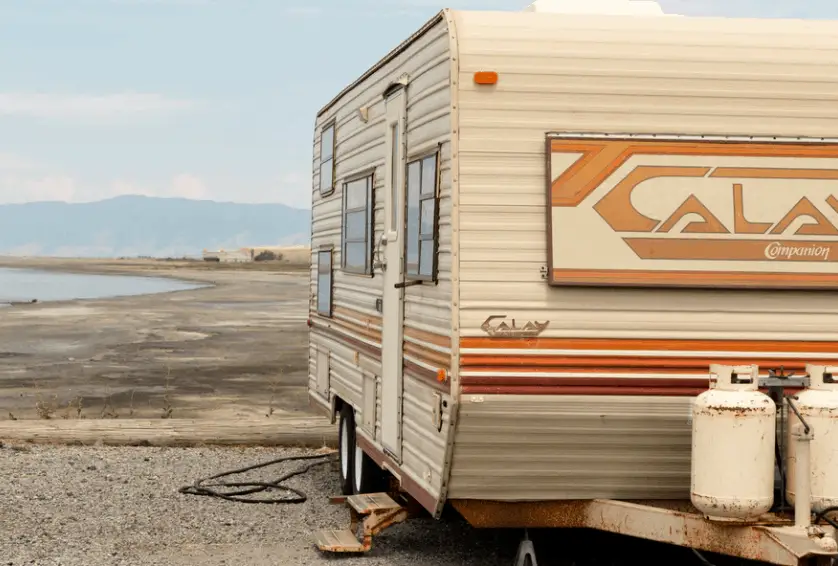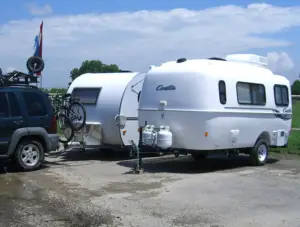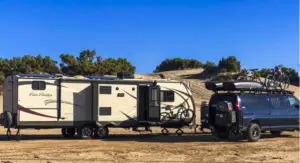If you’re an RV owner, you probably already know about the 10-year rule.
There are countless debates surrounding the said rule for RVs. Some, especially park owners, agree to it.
The other half thinks that this is just another way of discriminating against old RVs. Nevertheless, this continues to spark controversies because of its continuous implementation.
Today, we’ll talk all about the 10-year RV rule. We’ll also answer some of the most frequently asked questions for your guide.
What exactly is the 10-year rule for RVs?
The 10-year RV rule states that RVs that are 10 years old and over are not allowed to enter an RV park. This is common in private high-end RV parks and campgrounds.
However, the main thing about this rule is that this bases mainly on how the RV looks.
This means that even if your RV is not 10 years old and above, if it looks faulty, you won’t still be able to go past the rule. This is most especially if you have apparent issues with your windows, AC, rigs, and likes.
This rule has been a hot topic for those in the RV field.
Does the 10-year rule for RVs make sense?
In a way, the 10-year RV rule makes sense. While this may not seem like it for RV owners, this is just a logical measure for RV parks.
Florida and Arizona are the top 2 states that use this rule.
Because RV parks and campgrounds are still businesses, it’s their task to regulate the vehicles that will enter and use their grounds.
This is the main reason why they implement the rule. They also have an image to build and maintain.
What doesn’t make sense is how the rule evaluates RVs. They specifically state in the rule that it applied to vans that 10 years old and above.
However, they make a decision based on the vehicle’s current condition rather than its age. This scraps the general thought of the rule.
Though the previous case is understandable due to safety concerns, some decade-old RVs are still rejected despite the perfectly good condition when regulators know of their age.
What are the problems with the 10-year RV rule?
There are many problems with the 10-year RV rule. These include lack of clarity, discrimination, and poor administration. These issues are also addressed mainly by RV owners.
The 10-year RV rule lacks clarity. The line separating the eligible RVs and the other side is blurry.
This results in several questions and unclear answers among the RV community.
This issue mostly revolves around the relationship of the RV’s appearance with its system.
The rule shows discriminatory tendencies. This is one of the biggest problems with the rule.
While safety concerns are valid, some high-end RV parks tend to use this as a reason to reject certain owners and vehicles.
This unnecessarily creates stereotypes against people who don’t have the budget to invest in new RV vans every 10 years.
What’s more, despite the issues that this rule raises, this continues to be implemented in private parks.
Is it a legal rule?
The 10-year rule for RVs is legal.
As an RV owner, you can’t sue a park or campground for implementing such a rule.
They have the right to turn you away or ask you to leave. This is even if you have booked an earlier appointment.
Unless there is fraud or scam involved, the rule is recognized by the law.
Does KOA have the 10-year RV rule?
KOA works through franchised campgrounds from different locations. This means that the validity of the rule will depend on each owner.
Some may be practicing the 10-year rule, while some does not think of it.
KOA is one of the most popular RV campgrounds. This is all over the United States and Canada.
To be specific, this can include a long line of 500 camping networks. Considering that there are these many, you can expect that at least a quarter of them does not turn away old RVs.
Do national parks enforce the same rules and restrictions for older RVs?
Because national parks are public properties, they don’t usually implement the 10-year rule.
This means that even if your RV is decades old, you can feel free to camp and stay out there for several days. They also don’t limit the type of RV that you can bring.
National parks, however, have restrictions regarding an RV’s length. Most national parks keep the average maximum limit to 27 feet.
Anything longer than that can cause them to turn you away.
The only problem that you may have with national parks is the limited space. Still, this is hardly a big deal, especially if you reserve your own space.
What are the consequences of the 10-year RV rule?
Although the 10-year RV rule is legally recognized, the consequences of breaking this will not make you a criminal.
Some consequences include paying a fine, being pushed out of the campgrounds, or being turned away.
The first two rarely happen. They can only happen if you trick your way in the park site, and they see through you in the long run.
Usually, you’re just going to be turned away if you have a 10-year old RV. Still, you can expect some to have their own exceptions.
For example, some just ask for your vehicle’s pictures and submit them for approval regardless of age.
Why do RV campgrounds restrict such RVs?
There are three main reasons as to why RV campgrounds restrict old RVs. These include safety, image maintenance, and past experiences.
RV parks need to keep their site safe. They, however, find old RVs prone to faulty systems.
If they leave this uncontrolled, and its systems eventually fail, they’d lose their site, job, or in worst cases, their life.
High-end RV campgrounds and sites give importance to their image. Each park has an image, reputation, and aesthetic that they’re trying to maintain.
Old RVs, though, rarely align with their goals. This is most especially true for distinct RVs.
This and their need to attract high-end clients are the most common reasons behind the rule.
Some RV park owners implement the rule due to past experiences.
If the RV park owners or employees previously encountered problems with old RVs, they may use the rule from preventing it to happen again.
This will also save them from the hassle of going through the same trouble and repairs again.
Note that the reasons above are valid, especially on the RV park’s side. What’s not reasonable is the discrimination-related issues that the owners may intentionally set.
Is the 10-year rule widespread in RV parks?
The 10-year RV rule is not a widespread policy among RV parks. This is only usually used by private and exclusive RV campgrounds.
Public and small-time RV establishments, on the other hand, rarely implement the rule.
The bottom line, you don’t have to worry about your RV activities being restricted by the rule.
How will you know if the RV parks/campgrounds do not allow 10-year RVs and older?
You can simply visit their website to know if an RV park or campground follows the 10-year rule.
You can usually find this on their policies and rules page. If they don’t have a site, consider looking into their social media sites.
As a last alternative, you can also get the park’s phone number. Only then can you call the park and ask questions.
How can you get around such rule? Is it even possible?
You can easily get around the 10-year RV rule through simple strategies and effective communication.
If your RV is 10 years old and above, here are some things that you can do:
- Find an alternative park. Consider going to public parks and camping sites to be sure that they don’t follow the 10-year rule.
- Opt for the overnight option. Most parks usually allow old RVs to stay the night despite the 10-year rule.
- Talk to the park manager and/or owner for negotiations. Show a picture of your RV and its current condition. Sometimes, it only needs a little convincing to let your RV in their property.
- Keep your RV in its best condition, avail repairs, and renovate faulty parts. This will help convince the RV parks that your vehicle won’t cause any trouble.
As you can see, the rule is not exactly bulletproof. It won’t be impossible to go above it, even in the strictest RV parks.
Should you be wary of the 10-year RV rule?
The 10-year RV rule is not something to be taken lightly. Still, there’s no need to be cautious about this.
If you’re a regular in private RV campgrounds, then you should be wary of the 10-year rule.
However, if you usually travel and stay on public grounds and parks, this won’t affect you, your RV, and your activities.
Either way, you don’t have to be wary of this rule. The worst thing that you can happen is you not being allowed to enter a certain park.
Hence, there’s no need for excessively buying a new RV every after 10 years.
Summary
For a quick answer, the 10-year rule for RVs is often implemented in private RV campgrounds.
This prohibits RVs that are 10 years old and more to enter the camping site. This, however, merely relies on the vehicle’s appearance, so it’s easy to get around this.
Only private parks maintain this. The main reason revolves around attracting high-end clients.
You shouldn’t worry if the rule covers your RV. You can still use this on public grounds, national parks, and likes.





